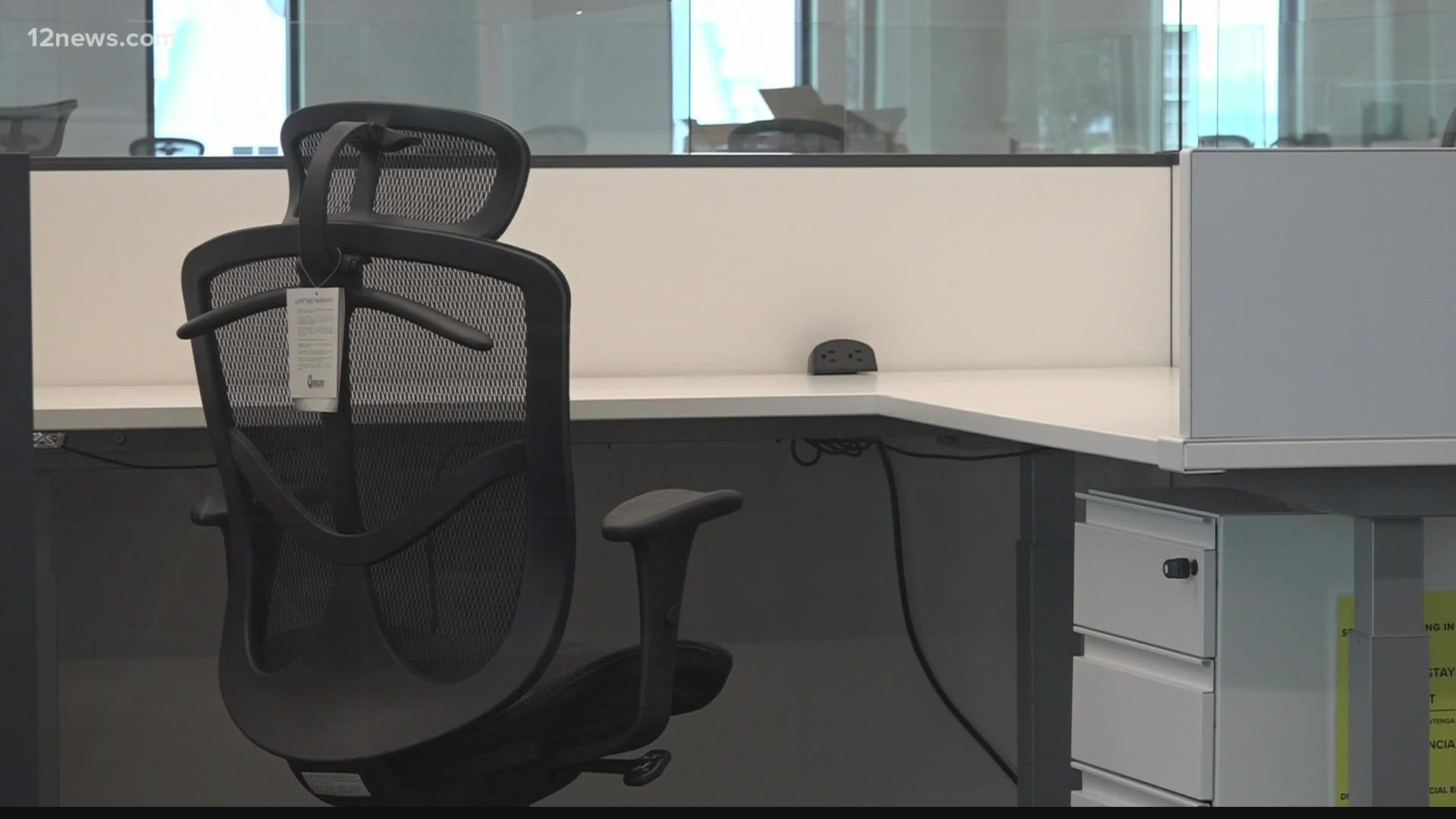PHOENIX — The State of Arizona estimates more than $7 million has been saved on rent with having thousands of government employees continuing to work remotely.
More than 15,000 state employees are working at least one pay period outside of a traditional office setting according to the State of Arizona’s Chief Operating Officer Sarah Rose Webber, and offices have been revamped for the changing working landscape.
Same building, new workspace
Down Washington Street in Downtown Phoenix, a state building has gotten a makeover thanks to remote work.
“This building used to be one of those sad, old, bureaucratic government buildings,” Webber said. “It’s now been transformed into this modern workplace that’s a hotel-ing, co-working space.”
Each floor has cubicles that sit empty, free for state government employees to drop in as needed for work. Lining some hallways are also conference rooms that can adjust to accommodate as many people as needed.
“We saw very quickly that this is a change that’s here to stay,” Webber said.
Almost 65 percent of the state government’s workforce is still working remotely. Pre-pandemic less than 10 percent of the State of Arizona’s employees worked remotely.
“What we find is that they’re more productive, they’re more efficient and more engaged,” Webber said.
However, with downsizing offices to an as-needed basis, Webber said the state’s saved $7 million in taxpayer dollars thanks to not paying that in rent for office space.
The decision to be a remote-work model is made on a management level in each department the state runs, Webber said. The idea is that what may work for one department, may be different for another.
“Remote work isn’t going anywhere in any industry,” Webber said.
A necessity becoming a reality
Working remotely was a necessity for many as the COVID-19 pandemic began, but Blake Ashforth, the Horace Steele Arizona Heritage Chair in the Management and Entrepreneurship Department of the W. P. Carey School of Business at ASU, said it’s likely here to stay.
“Gallup did their most recent poll and they found that 45% of the full-time workforce in the states is now working remotely,” Ashforth said.
Ashforth said the biggest struggle companies face is the impromptu interactions co-workers used to get when coming into the office.
“That is the stuff that greases the social wheels,” Ashforth said. “You really do you want to have your people having these quick, off-the-cuff conversations. That is how you build cultures, that is how you build trust, that’s how you build cohesion.”
Ashforth said he predicts employees and employers seeing the benefits of remote work and lack of drop-off in productivity will likely move forward into hybrid workplace models.
“I think the fact that employees and employers are now both on the same bus of how can we make this work makes it all the more likely that we’re going to see some type of hybrid model going forward,” Ashforth said.
Building culture without stepping into the office
It was during February of 2020 when Jordan Lickteigh accepted a promotion to be a Contractor Relations Manager for OneGuard Home Warranty.
Lickteigh moved his family down from Iowa to Arizona but hasn’t gone into the office for work.
“I came down in June 2020 with the intention that at some point our offices would open back up, and they just never did,” Lickteigh said.
Lickteigh notes the work-from-home model has benefitted his family. Allowing him to get to his kids’ school as needed as it’s down the road from his home, not across the Valley from his office.
But Lickteigh said working from home and building team culture virtually hasn’t been easy.
Lickteigh notes it’s those personal interactions that help employees set roots in the company, and is grateful his company has helped train managers to help build a culture in the virtual environment.
“We’re so siloed and unless they’re in a pertinent meaning for you in your virtual environment and they’re on your Zoom, I don’t see people anymore that I used to say hi to a regular basis,” Lickteigh said.
Arizona Politics
Track all of our current updates with Arizona politics on our 12 News YouTube channel. Subscribe for updates on all of our new uploads.

